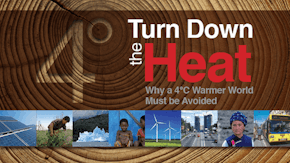In October 2016 Professor Mandle gave a talk on climate change here in Georgetown. I was not aware of it at the time but write it now as I feel it covered some keys points which have not had public attention so far. It was brought to my attention by the Vice-Chancellor of University of Guyana in his address at a similar function recently. It was clear that he also felt it was an important address.
Below is a review of a few keys points of the talk.
The talk was entitled 'Petroleum and Climate Change in Guyana’s Future' and was delivered for the inaugural C.Y.Thomas Distinguished Lecture as a part of the week-long celebration of the University of Guyana 50th Graduation on Thursday 27th October 2016. It delivered by the distinuished Professor Jay Mandle of Colgate University, New York.
The talk consists of some nineteen pages. It can be found online in
text format
here. One of several references is to an important ECLAC report from 2011 entitled "An assessment of the economic impact of climate change on the Coastal and Human Settlements Sector in Guyana" which is available online
here.
The talk starts with some background on the widely respected Professor Thomas. This brief review is concerned primarily with climate change so we will move on to where Professor Mandle begins to focus on Guyana and climate change.
The Coast - in this section some geography is outlined and the vulnerability of Guyana to flooding due to its long-standing and barely adequate system of sea walls and gravity drainage.
Summarising he says:
"In short, global climate change means that the Guyanese Coast will be invaded by both salt and fresh water flooding."
Petroleum - the prospect of large incomes from oil is outlined. The challenge of corruption is identified.
Petro-dollars - four claims on oil dollars are given, namely: a fund for unexpected government spending, poverty-alleviation, increased spending on normal government functions, a sovereign wealth fund.
The Problem of Adaptation - the question of adaption of the coastal area to climate change and sea level rise is considered.
"With the consequences of climate looming, Guyana would seem to be facing the need to choose between two competing strategies: whether to try to protect the Coast with adaptation, or alternatively, to initiate a substantial if not total relocation to the Interior."
And "...adaptation on the Coast is not a viable option over the long run".
Interior Development - planning for probable relocation inland will be very challenging and expensive.
"Guyana will have to relocate at least sections of its population, economy, government, and civil society to the Interior. Doing so will be a radical departure for the country."
"Rice, sugar and ground provisions are grown on the Coast. None of these is likely to be part of the country’s comparative advantage structure in the Interior. Entirely new crops will have to be cultivated and new industries will have to be built..."
So it seems sugar has no future in Guyana.
"Access to and from the Interior at the moment is too limited for it to support the level of economic activity that will be necessary."
"Petro-dollars will make it possible to finance much of this investment in infrastructure."
The Need to Debate - public consideration of the issue has yet to begin. This concludes the talk.
"There is much excitement concerning the country’s future as a petroleum exporter. But the need to use those funds to settle the Interior has not been the subject of public discussion. Overcoming this reticence, and debating the merits of Interior development is something that should begin as soon as possible."
Reference is made to the talk in the University of Guyana publication 'Renaissance' to be found
here.










